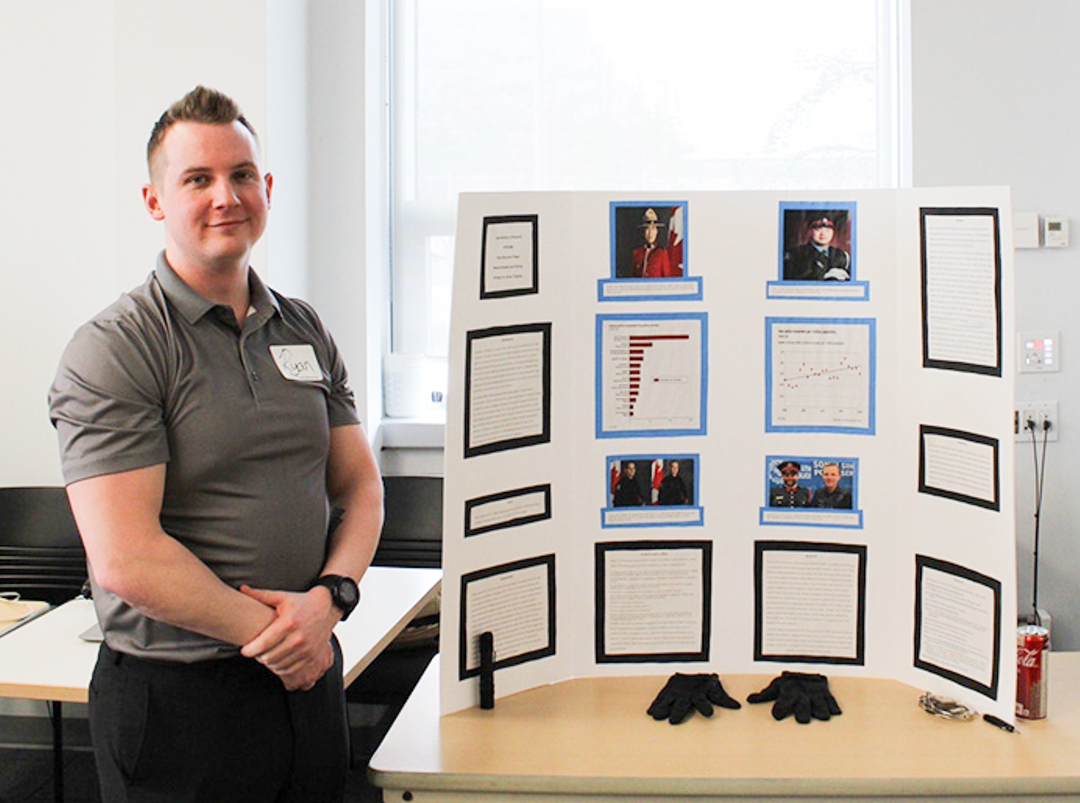On April 6 and April 14, graduating students in the police foundations program presented their capstone thesis projects related to justice, community service and law enforcement.
Both events were held in the CA-building and open to Algonquin College students alongside faculty. Roughly 60 fourth-level police foundations students presented the culmination projects they started earlier in the year.
Ryan Topping, a graduating student, presented his research on the benefits of added mental health training in policing.
“My thesis specifically was that mental health calls have a better outcome when first responders have more training for nonviolent crisis intervention or community outreach programs,” Topping said.
He compiled data on documented instances of police officers dying on the job while responding to mental health calls.
On top of scouring through eight academic studies, Topping also drew upon his own personal knowledge for his thesis.
“Working on the mental health unit at the hospital, we deal with a lot of people in crisis. When they come in on their first day they’re in crisis and sometimes day to day they’ll have breakdowns or they’ll go into crisis,” he said. “Nonviolent crisis intervention is de-escalation through communication, being responsive to the person and addressing their needs but not lying to them about the situation.”
“One in five calls you go to, you’re dealing with someone who’s just had the worst day of their life,” Topping added. “So, you need that training – that empathy – to really help with whatever the situation is.”
Jill Reeves, the police foundations program coordinator, left the April 14 event impressed.
“I was impressed by the knowledge the students shared in terms of the detail. The fact that they previously submitted research papers, and received feedback earlier in the semester, led to being able to deliver a really smooth presentation quite confidently,” Reeves said.
Another student, Josh Eaylin, sought to prove whether football players are likely to commit a crime due to chronic traumatic encephalopathy, a brain condition caused by repeated blows to the head.
“I played football when I was younger, so I thought it’d be a cool thing to relate football back with policing and law,” he said.
Although he didn’t find any direct links between CTE and committing crime, he did uncover possible contributing factors.
“Brain injuries make you more susceptible to anger, poor judgment and impulsivity as well, but there’s no specific link between crime and CTE,” Eaylin added.
Jane Trakalo, the dean of health, public safety and community studies, attended the April 6 event and talked to several students.
“I was very surprised by the wide variety of topics students chose. There were very few duplicates and it just goes to show the level of breadth and depth of their work,” Trakalo said.
The dean also touched on the possibility of next year’s fourth-level students getting a similar event.
“I think I’d like to hear from the students and if they felt it was a worthwhile event. I certainly thought it was and I would definitely like to see it become a yearly event,” she added.


